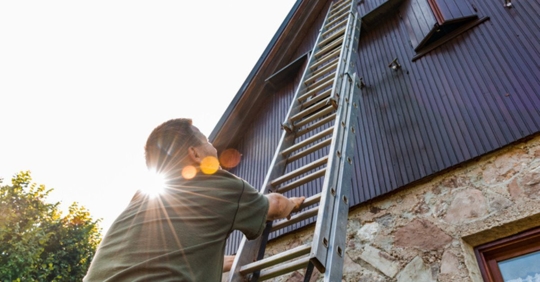Types of Roofing Services
When it comes to roofing services, there are several options available to homeowners and businesses alike. Installation is a primary service, involving the complete setup of a new roof, whether for a new building or replacing an old roof. This process requires careful planning and selection of materials to ensure durability and aesthetic appeal. Repair services address specific issues such as leaks, damaged shingles, or structural weaknesses. Regular maintenance is also crucial, involving routine inspections and minor repairs to prevent major issues from developing. Each of these services plays a vital role in maintaining the integrity and longevity of a roof.
Residential and commercial roofing services differ significantly in terms of scale, materials, and techniques used. Residential roofing typically involves materials like asphalt shingles, wood, or metal, designed to complement the home’s architecture. In contrast, commercial roofing often requires flat or low-slope roofs made from materials like TPO, EPDM, or modified bitumen, which are designed to withstand different environmental stresses. Understanding these differences is essential for selecting the right service and materials for your specific roofing needs.
Choosing the Right Roofing Contractor
Selecting a reputable roofing contractor is crucial to ensuring a successful roofing project. Begin by researching local contractors, checking online reviews, and asking for recommendations from friends and family. Look for contractors with a proven track record, proper licensing, and insurance to protect against any liabilities. It's also wise to verify their experience with the specific type of roofing service you need, whether it's installation, repair, or maintenance. A reputable contractor will be transparent about their processes and willing to provide references from past clients.
When interviewing potential contractors, ask pertinent questions to gauge their expertise and reliability. Inquire about their experience with similar projects, the types of materials they recommend, and their approach to handling unexpected issues. It's also important to discuss timelines, warranties, and payment schedules upfront. A quality contractor will provide clear, detailed answers and be willing to address any concerns you may have. By taking these steps, you can ensure you choose a contractor who will deliver quality service and peace of mind.
Obtaining and Comparing Quotes
Estimating the cost of a roofing project can be daunting, but obtaining and comparing quotes from different contractors is a crucial step. Start by requesting detailed estimates from at least three contractors, ensuring each quote includes a breakdown of materials, labor, and any additional costs. This transparency allows you to compare apples to apples and avoid hidden fees. Pay attention to the scope of work outlined in each quote, as some contractors may offer more comprehensive services than others. A thorough comparison will help you identify the best value for your investment.
Several factors influence roofing costs, including the type of materials chosen, the complexity of the roof design, and the labor involved. High-quality materials like metal or slate may have a higher upfront cost but offer greater longevity and durability. Labor costs can vary based on the contractor's expertise and the project's complexity. Additionally, factors such as the roof's pitch, accessibility, and any necessary structural repairs can impact the overall cost. Understanding these variables will help you set a realistic budget and avoid unexpected expenses.
Protecting Your Belongings
Before any roofing work begins, it's essential to protect your home's interior from potential damage. Start by moving valuable items such as electronics, artwork, and fragile decorations to a safe location. Cover furniture and other large items with tarps or plastic sheeting to shield them from dust and debris. It's also wise to remove any ceiling fixtures or hanging items that could be disturbed during the roofing process. Taking these precautions will help ensure your belongings remain safe and undamaged throughout the project.
In addition to safeguarding your belongings, consider setting up a temporary workspace or living area away from the construction zone. This can help minimize disruptions to your daily routine and provide a safe space for family members. If possible, plan to be out of the house during the most intensive phases of the roofing work. By taking these steps, you can maintain a comfortable and secure environment while your roof is being serviced.
Ensuring Safety for Occupants
Safety should be a top priority when preparing for a roofing project. If possible, arrange for temporary relocation during the most disruptive phases of the work, especially if you have young children or pets. If relocation isn't feasible, establish safe zones within the home that are away from the construction area. Clearly communicate these boundaries to all family members to prevent accidental entry into hazardous areas.
Keeping children and pets away from the work area is crucial to prevent accidents and injuries. Ensure that all family members understand the importance of staying clear of the construction zone and any equipment or materials. By prioritizing safety, you can protect your loved ones and ensure the roofing project proceeds smoothly and without incident.
Clearing the Work Area
Preparing the exterior of your home is just as important as the interior. Begin by clearing the work area of vehicles, outdoor furniture, and decorations to provide contractors with unobstructed access to the roof. This not only facilitates the roofing process but also protects your belongings from potential damage. Additionally, consider trimming trees and shrubs that may impede access or pose a risk to the roofing crew. A clear and organized work area helps ensure the project is completed efficiently and safely.
Communicating with your neighbors about the upcoming roofing work is a courteous and practical step. Inform them of the expected start and end dates, as well as any potential disruptions such as noise or debris. Address any concerns they may have and assure them that the work will be conducted professionally and with minimal impact on their daily lives. By fostering open communication, you can maintain good relationships with your neighbors and create a supportive environment for the roofing project.
Communicating with Neighbors
Open communication with your neighbors is essential when planning a roofing project. Start by informing them of the scheduled work dates and any potential disruptions, such as noise or debris. This proactive approach helps manage expectations and reduces the likelihood of misunderstandings. Be receptive to any concerns they may have and address them promptly, ensuring that everyone is on the same page.
Consider offering your contact information in case they have questions or need to reach you during the project. By maintaining a positive and communicative relationship with your neighbors, you can foster a supportive community atmosphere and minimize any inconvenience caused by the roofing work.
Scheduling and Duration
Understanding the timeline of a roofing project is crucial for effective planning. The duration of a roofing project can vary depending on the type of service, the size of the roof, and the complexity of the work involved. For instance, a simple roof repair may only take a day or two, while a complete roof installation could take a week or more. Weather conditions also play a significant role in scheduling, as rain or extreme temperatures can delay progress. Discussing these factors with your contractor will help you set realistic expectations and plan accordingly.
Monitoring the progress and quality of the roofing work is essential to ensure the project stays on track. Regularly communicate with your contractor to receive updates on the project's status and any potential delays. It's also important to verify that the materials and workmanship meet the agreed-upon standards. Conducting periodic inspections during the project can help identify any issues early on, allowing for timely resolutions. By staying informed and involved, you can ensure a successful roofing project that meets your expectations.
Monitoring Progress and Quality
Keeping track of the progress and quality of your roofing project is vital to ensuring a successful outcome. Establish regular communication with your contractor to receive updates on the project's status and any potential delays. This proactive approach allows you to address any issues promptly and keep the project on schedule. Additionally, conducting periodic inspections during the work can help identify any concerns early on, allowing for timely resolutions.
To ensure the quality of materials and workmanship, verify that the contractor is using the agreed-upon materials and following industry best practices. Don't hesitate to ask questions or request clarification if something seems amiss. By maintaining an active role in monitoring the project, you can ensure that the final result meets your expectations and provides lasting value.
Inspecting the Completed Work
Once the roofing project is complete, conducting a thorough inspection of the new roof is essential. Begin by examining the roof's surface for any visible defects or inconsistencies, such as uneven shingles or exposed nails. Check for proper flashing installation around chimneys, vents, and other roof penetrations to ensure a watertight seal. It's also wise to inspect the attic for any signs of leaks or moisture intrusion. Address any issues or concerns promptly with your contractor to ensure they are resolved before finalizing the project.
Routine maintenance is crucial for prolonging the lifespan of your new roof. Schedule regular inspections and cleanings to remove debris and prevent the buildup of moss or algae. Address any minor repairs promptly to prevent them from developing into more significant issues. By staying proactive with maintenance, you can protect your investment and ensure your roof remains in optimal condition for years to come.
Maintenance and Warranty
Understanding and utilizing your roofing warranty is an important aspect of post-service considerations. Familiarize yourself with the terms and conditions of the warranty, including coverage details and any maintenance requirements. Regular maintenance is often necessary to keep the warranty valid, so be sure to adhere to the recommended schedule. In the event of any issues, contact your contractor promptly to address them under the warranty's terms. By staying informed about your warranty, you can ensure you receive the full benefits and protection it offers.
Get Ready for the Roof Service you Deserve, with Hargrove Roofing
Preparing for a roofing project involves careful planning and consideration of various factors. By understanding the roofing service process, choosing the right contractor, and taking steps to protect your home and belongings, you can ensure a smooth and successful experience. If you're looking for reliable roofing services, consider reaching out to Hargrove Roofing. Our team of experienced professionals is dedicated to providing high-quality roofing solutions tailored to your needs. Contact us today to learn more about how we can assist with your roofing project.
Call Hargrove Roofing at (888) 415-2299 or contact us online.

